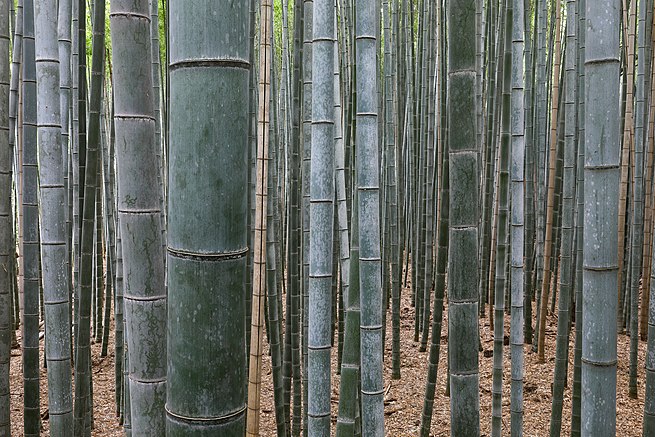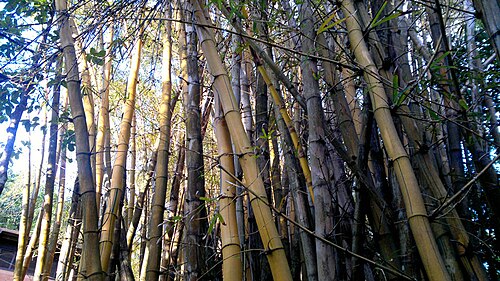Canenoun
A plant with simple stems, like bamboo or sugar cane, or the stem thereof.
Canenoun
(uncountable) The slender, flexible main stem of a plant such as bamboo, including many species in the grass family Gramineae.
Canenoun
(uncountable) The plant itself, including many species in the grass family Gramineae; a reed.
Canenoun
(uncountable) Sugar cane.
Canenoun
Maize or, rarely, sorghum, when such plants are processed to make molasses (treacle) or sugar.
Canenoun
The stem of such a plant adapted for use as a tool.
Canenoun
(countable) A short rod or stick, traditionally of wood or bamboo, used for corporal punishment.
Canenoun
(uncountable) Corporal punishment by beating with a cane.
Canenoun
A lance or dart made of cane.
Canenoun
A rod-shaped tool or device, somewhat like a cane.
Canenoun
(countable) A strong short staff used for support or decoration during walking; a walking stick.
Canenoun
A length of colored and/or patterned glass rod, used in the specific glassblowing technique called caneworking.
Canenoun
(countable) A long rod often collapsible and commonly white (for visibility to other persons), used by vision impaired persons for guidance in determining their course and for probing for obstacles in their path.
Canenoun
(uncountable) Split rattan, as used in wickerwork, basketry and the like.
Canenoun
A local European measure of length; the canna.
Caneverb
To strike or beat with a cane or similar implement.
Caneverb
To destroy; to comprehensively defeat.
Caneverb
To do something well, in a competent fashion.
Caneverb
To produce extreme pain.
Caneverb
(transitive) To make or furnish with cane or rattan.
Canenoun
A name given to several peculiar palms, species of Calamus and Dæmanorops, having very long, smooth flexible stems, commonly called rattans.
Canenoun
A walking stick; a staff; - so called because originally made of one of the species of cane.
Canenoun
A lance or dart made of cane.
Canenoun
A local European measure of length. See Canna.
Caneverb
To beat with a cane.
Caneverb
To make or furnish with cane or rattan; as, to cane chairs.
Canenoun
a stick that people can lean on to help them walk
Canenoun
a strong slender often flexible stem as of bamboos, reeds, rattans, or sugar cane
Canenoun
a stiff switch used to hit students as punishment
Caneverb
beat with a cane
Canenoun
the hollow jointed stem of a tall grass, especially bamboo or sugar cane, or the stem of a slender palm such as rattan.
Canenoun
any plant that produces canes.
Canenoun
stems of bamboo, rattan, or wicker used as a material for making furniture or baskets
Canenoun
short for sugar cane
Canenoun
a flexible woody stem of the raspberry plant or any of its relatives
Canenoun
a length of cane or a slender stick, especially one used as a support for plants, a walking stick, or an instrument of punishment
Canenoun
a form of corporal punishment used in certain schools, involving beating with a cane
Caneverb
beat with a cane as a punishment
Caneverb
defeat heavily or punish severely
Caneverb
take (drink or drugs) in large quantities
Bamboonoun
A grass of the Poaceae family, characterised by its woody, hollow, round, straight, jointed stem, all of which are in the Bambuseae tribe.
Bamboonoun
The wood of the bamboo plant as a material or cane.
Bamboonoun
A didgeridoo.
Bamboonoun
(slang) A member of the British military or British East India Company who spent so much time in Indonesia, India, or Malaysia that they never went back home.
Bambooadjective
Made of the wood of the bamboo.
Bambooverb
(transitive) To flog with a bamboo cane.
Bambooverb
(transitive) To paint (furniture, etc.) to give it the appearance of bamboo.
Bambooverb
To penetrate sexually.
Bamboonoun
A plant of the family of grasses, and genus Bambusa, growing in tropical countries.
Bambooverb
To flog with the bamboo.
Bamboonoun
the hard woody stems of bamboo plants; used in construction and crafts and fishing poles
Bamboonoun
woody tropical grass having hollow woody stems; mature canes used for construction and furniture
Bamboo
Bamboos are a diverse group of evergreen perennial flowering plants in the subfamily Bambusoideae of the grass family Poaceae. The origin of the word is uncertain, but it probably comes from the Dutch or Portuguese language, which originally borrowed it from Malay or Kannada.In bamboo, as in other grasses, the internodal regions of the stem are usually hollow and the vascular bundles in the cross-section are scattered throughout the stem instead of in a cylindrical arrangement.




































